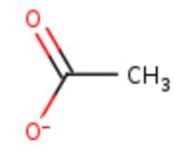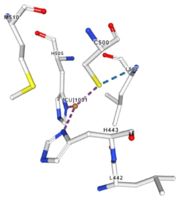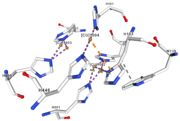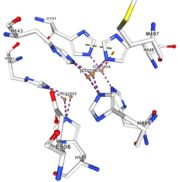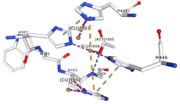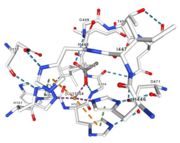User:Estelle Blochouse/ Sandbox 1497
From Proteopedia
(Difference between revisions)
| Line 49: | Line 49: | ||
<table><tr><td colspan='2'>In the chain, five ligands are present: an acetate ion (C2H3O2) and four copper ions. <br> | <table><tr><td colspan='2'>In the chain, five ligands are present: an acetate ion (C2H3O2) and four copper ions. <br> | ||
</td></tr><tr><td>[[Image:Cu1001.jpg|thumb|left|'''Figure 2:''' Copper 1001<ref><span class='plainlinks'>[https://www.rcsb.org/structure/4e9s RCBS PDB]</span></ref>]]</td><td>Cu1001: The copper ion is bound with H443, H505 and C500 thanks to three metallic interactions. The structure is stabilised by hydrogen bounds with L502, M510.</td></tr> | </td></tr><tr><td>[[Image:Cu1001.jpg|thumb|left|'''Figure 2:''' Copper 1001<ref><span class='plainlinks'>[https://www.rcsb.org/structure/4e9s RCBS PDB]</span></ref>]]</td><td>Cu1001: The copper ion is bound with H443, H505 and C500 thanks to three metallic interactions. The structure is stabilised by hydrogen bounds with L502, M510.</td></tr> | ||
| - | <tr><td>[[Image:Cu1002.jpg|thumb|left|'''Figure 3:''' Copper 1002<ref><span class='plainlinks'>[https://www.rcsb.org/structure/4e9s RCBS PDB]</span></ref>]]</td><td>Cu1002: The binuclear copper ion is bound with three | + | <tr><td>[[Image:Cu1002.jpg|thumb|left|'''Figure 3:''' Copper 1002<ref><span class='plainlinks'>[https://www.rcsb.org/structure/4e9s RCBS PDB]</span></ref>]]</td><td>Cu1002: The binuclear copper ion is bound with three three histidines : H501, H103, and H141. Each bound is a double metallic interaction because the two nucleus of the binuclear ion are bound. The structure is stabilised by hydrophobic contact between H141 and W139</td></tr> |
<tr><td>[[Image:Cu1003.jpg|thumb|left|'''Figure 4:''' Copper 1003<ref><span class='plainlinks'>[https://www.rcsb.org/structure/4e9s RCBS PDB]</span></ref>]]</td><td>Cu1003: The binuclear copper ion is bound with three with three histidines : H499, H143, and H448. Each bound is a double metallic interaction. The structure is stabilised by Pi interactions with Cu1004 and H101</td></tr> | <tr><td>[[Image:Cu1003.jpg|thumb|left|'''Figure 4:''' Copper 1003<ref><span class='plainlinks'>[https://www.rcsb.org/structure/4e9s RCBS PDB]</span></ref>]]</td><td>Cu1003: The binuclear copper ion is bound with three with three histidines : H499, H143, and H448. Each bound is a double metallic interaction. The structure is stabilised by Pi interactions with Cu1004 and H101</td></tr> | ||
| - | <tr><td>[[Image:Cu1004.jpg|thumb|left|'''Figure 5:''' Copper 1004<ref><span class='plainlinks'>[https://www.rcsb.org/structure/4e9s RCBS PDB]</span></ref>]]</td><td>Cu1004: The copper ion is bound by metallic interaction with two | + | <tr><td>[[Image:Cu1004.jpg|thumb|left|'''Figure 5:''' Copper 1004<ref><span class='plainlinks'>[https://www.rcsb.org/structure/4e9s RCBS PDB]</span></ref>]]</td><td>Cu1004: The copper ion is bound by metallic interaction with two histidines : H101 and H446, and with Act1005. The structure is stabilised by Pi interactions between H446 and two other histidine : H103 and H448. Cu1004 bounds also by Pi interactions with H103 and H448. Moreover, their are Pi interactions between H113 and H446</td></tr> |
<tr><td>[[Image:Act10051.jpg|thumb|left|'''Figure 6:''' Acetate ion 1005<ref><span class='plainlinks'>[https://www.rcsb.org/structure/4e9s RCBS PDB]</span></ref>]]</td><td>Act1005: The acetate ion is linked by hydrogen bonds to G104 and G449.</td></tr> | <tr><td>[[Image:Act10051.jpg|thumb|left|'''Figure 6:''' Acetate ion 1005<ref><span class='plainlinks'>[https://www.rcsb.org/structure/4e9s RCBS PDB]</span></ref>]]</td><td>Act1005: The acetate ion is linked by hydrogen bonds to G104 and G449.</td></tr> | ||
</table> | </table> | ||
Revision as of 19:13, 11 January 2019
Multicopper Oxidase CueO (4e9s)
| |||||||||||
References
- ↑ EMBL-EBI, Family: Cu-oxidase (PF00394), Summary: Multicopper oxidase, http://pfam.xfam.org/family/Cu-oxidase
- ↑ UniProtKB
- ↑ Bento I, Martins LO, Gato Lopes G, Arménia Carrondo M, Lindley PF, Dioxygen reduction by multi-copper oxidases; a structural perspective, November 2005
- ↑ Messerschmidt A, Huber R, The blue oxidases, ascorbate oxidase, laccase and ceruloplasmin. Modelling and structural relationships, Eur. J. Biochem. 187, January 1990
- ↑ Ouzounis C, Sander C, A structure-derived sequence pattern for the detection of type I copper binding domains in distantly related proteins, FEBS Lett. volume 279, February 1991
- ↑ Hirofumi Komori, Ryosuke Sugiyama, Kunishige Kataoka, Kentaro Miyazaki, Yoshiki Higuchib, and Takeshi Sakurai, New insights into the catalytic active-site structure of multicopper oxidases, Biological Crystallography, 6 December 2013 doi:10.1107/S1399004713033051
- ↑ RCBS PDB
- ↑ RCBS PDB
- ↑ RCBS PDB
- ↑ RCBS PDB
- ↑ RCBS PDB
- ↑ RCBS PDB
- ↑ Kataoka K, Komori H, Ueki Y, Konno Y, Kamitaka Y, Kurose S, Tsujimura S, Higuchi Y, Kano K, Seo D, Sakurai T. Structure and function of the engineered multicopper oxidase CueO from Escherichia coli--deletion of the methionine-rich helical region covering the substrate-binding site. J Mol Biol. 2007 Oct 12;373(1):141-52. Epub 2007 Aug 2. PMID:17804014 doi:10.1016/j.jmb.2007.07.041
